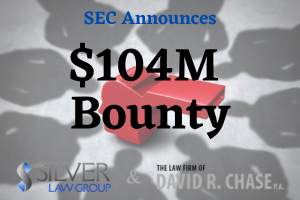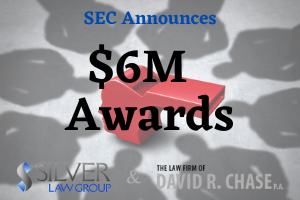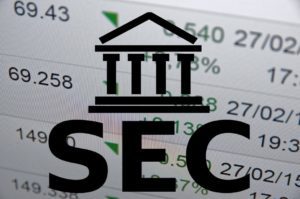 The US Department of Justice is planning to launch its own whistleblower program using the same model as the Securities and Exchange Commission (SEC) and Commodities Futures Trading Commission (CFTC). They will offer financial incentives to individuals who report wrongdoing and are ineligible for other rewards. Continue reading
The US Department of Justice is planning to launch its own whistleblower program using the same model as the Securities and Exchange Commission (SEC) and Commodities Futures Trading Commission (CFTC). They will offer financial incentives to individuals who report wrongdoing and are ineligible for other rewards. Continue reading
Articles Posted in Whistleblower
Seven Whistleblowers Collect $104M From SEC And Other Agencies
In the SEC’s latest press release , seven individuals have received bounties after supplying credible information and continued assistance that led to a successful enforcement action. The same information and assistance led to another successful related action by a different federal agency. The bounty of $104 million is the fourth largest award in the history of the SEC’s Whistleblower program. Continue reading
, seven individuals have received bounties after supplying credible information and continued assistance that led to a successful enforcement action. The same information and assistance led to another successful related action by a different federal agency. The bounty of $104 million is the fourth largest award in the history of the SEC’s Whistleblower program. Continue reading
CFTC Issues Warning About Romance Scams Involving Commodities and Derivatives
 Although we most frequently blog about the SEC and its whistleblower program, other federal agencies also have their own. One of those agencies is the US Commodity Futures Trading Commission (CFTC), which oversees all types of futures markets. This independent agency governs derivative markets, which includes futures, swaps, and some types of options.
Although we most frequently blog about the SEC and its whistleblower program, other federal agencies also have their own. One of those agencies is the US Commodity Futures Trading Commission (CFTC), which oversees all types of futures markets. This independent agency governs derivative markets, which includes futures, swaps, and some types of options.
Begun as a trading exchange for agricultural commodities, the CFTC now oversees a wide variety of commodities, including digital, such as cryptocurrency and foreign exchange markets (FOREX) that deal in foreign currency exchange.
There are legitimate ways for experienced investors to delve into digital assets like these. But many are led to believe that they are investing in something digital when they are actually being defrauded. Increasingly, it’s one by one of the oldest methods in the book: fraudulent dating and romance.
Ten Years: Celebrating National Whistleblower Day
 In this blog, we often discuss the financial bounties that whistleblowers receive from the US Securities & Exchange Commission (SEC) and occasionally, the Commodities Futures Trading Commission (CFTC.) What isn’t always discussed is the time and effort that it takes for a whistleblower to get to that point. Continue reading
In this blog, we often discuss the financial bounties that whistleblowers receive from the US Securities & Exchange Commission (SEC) and occasionally, the Commodities Futures Trading Commission (CFTC.) What isn’t always discussed is the time and effort that it takes for a whistleblower to get to that point. Continue reading
Two Whistleblowers Receive More Than $6M In SEC Bounties
 In a recent press release, the US Securities & Exchange Commission (SEC) announced the award of more than $6M in bounties in two separate orders. Both orders involve providing information to the SEC for two covered actions.
In a recent press release, the US Securities & Exchange Commission (SEC) announced the award of more than $6M in bounties in two separate orders. Both orders involve providing information to the SEC for two covered actions.
In the first order, the whistleblower was described as an “outside professional” who was the target of a product solicitation. Believing the product to be misrepresented, the individual contacted SEC staff to notify them of the activity. SEC staff opened an investigation, and the individual offered original information and continual assistance that led to a successful enforcement action. The Claims Review Staff (CRS) awarded this whistleblower “more than $3 million.” Continue reading
Financial Fraud And Corporate Disclosures
 Corporate regulations are nothing new. After the stock market crashed in 1929, plunging the U.S. into the Great Depression, federal regulation of corporate disclosures began. With the passage of the Securities Act of 1933 and the Securities Exchange Act of 1934, Congress attempted to make public companies more transparent about their financial transactions. Now, companies must make a wide range of financial disclosures to protect potential investors. Continue reading
Corporate regulations are nothing new. After the stock market crashed in 1929, plunging the U.S. into the Great Depression, federal regulation of corporate disclosures began. With the passage of the Securities Act of 1933 and the Securities Exchange Act of 1934, Congress attempted to make public companies more transparent about their financial transactions. Now, companies must make a wide range of financial disclosures to protect potential investors. Continue reading
Noteworthy Recent SPACs Fraud Cases
 As Special Purpose Acquisition Companies (SPACs) have become increasingly popular were being featured in the news, in recent months, there have been high-profile cases of fraud that have been equally noteworthy. And looking at a few of these is useful for those becoming SPAC whistleblowers—to understand the legal issues some SPACs are facing…. Continue reading
As Special Purpose Acquisition Companies (SPACs) have become increasingly popular were being featured in the news, in recent months, there have been high-profile cases of fraud that have been equally noteworthy. And looking at a few of these is useful for those becoming SPAC whistleblowers—to understand the legal issues some SPACs are facing…. Continue reading
SPACs v. IPOs: Are The Differences Opportunities For Fraud?
 Some investors are increasingly opting to put their money in Special Purpose Acquisition Companies (SPACs) rather than Initial Public Offerings (IPOs). But some of the very same reasons why SPACs are comparatively more attractive may also be reasons why SPAC investors are more vulnerable to losses—and even outright fraud. Let’s explore a few of these differences to see why that’s the case. Continue reading
Some investors are increasingly opting to put their money in Special Purpose Acquisition Companies (SPACs) rather than Initial Public Offerings (IPOs). But some of the very same reasons why SPACs are comparatively more attractive may also be reasons why SPAC investors are more vulnerable to losses—and even outright fraud. Let’s explore a few of these differences to see why that’s the case. Continue reading
New SEC Rules For SPACs: What Are They And Why Do They Matter?
 While Special Purpose Acquisition Companies (SPACs) SPACs—shell companies created for the sole purpose of funding the future acquisition of another company—have existed since the 1990s, interest (and investing) in them took off during the pandemic. But the rise of SPAC popularity means that hedge funds and others have been entering the SPAC market, while a number of SPACs are under investigation. That has led the Securities and Exchange Commission (SEC) to propose new rules relating to SPACs. Continue reading
While Special Purpose Acquisition Companies (SPACs) SPACs—shell companies created for the sole purpose of funding the future acquisition of another company—have existed since the 1990s, interest (and investing) in them took off during the pandemic. But the rise of SPAC popularity means that hedge funds and others have been entering the SPAC market, while a number of SPACs are under investigation. That has led the Securities and Exchange Commission (SEC) to propose new rules relating to SPACs. Continue reading
SEC’s Priorities For 2022: What Are They And How Will This Impact SEC Whistleblowing?
 Leaders of the Securities and Exchange Commission (SEC) recently released its 2022 priorities for its Department of Examinations (EXAMS)—the office charged with monitoring risks and protecting investors. The SEC has made a point of saying the list is just a guideline. EXAMS will still pursue other investigations not on the list. But for those who are considering becoming a whistleblower, it can help strategize your reporting. Continue reading
Leaders of the Securities and Exchange Commission (SEC) recently released its 2022 priorities for its Department of Examinations (EXAMS)—the office charged with monitoring risks and protecting investors. The SEC has made a point of saying the list is just a guideline. EXAMS will still pursue other investigations not on the list. But for those who are considering becoming a whistleblower, it can help strategize your reporting. Continue reading
 SEC Whistleblower Lawyer Blog
SEC Whistleblower Lawyer Blog

